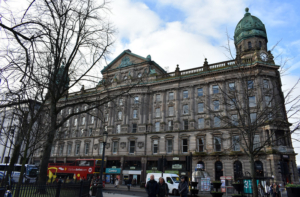Poverty Among Migrants in Northern Ireland
 According to the 2021 Census, the number of migrants in Northern Ireland, which the census measures in terms of residents of Northern Ireland who were born outside of the United Kingdom and Ireland, increased from 81,500 people (4.5% of the total population) to 124,300 people (6.5% of the population) between 2011 and 2021. By comparison, that figure was only 1.5% in 2001. Overall, the statistics reveal a general trend of increasing diversity across various metrics including ethnicity and national origin, with the percentage of census respondents who self-identified as “white” decreasing from 99.2% in 2001 to 98.2% in 2011.
According to the 2021 Census, the number of migrants in Northern Ireland, which the census measures in terms of residents of Northern Ireland who were born outside of the United Kingdom and Ireland, increased from 81,500 people (4.5% of the total population) to 124,300 people (6.5% of the population) between 2011 and 2021. By comparison, that figure was only 1.5% in 2001. Overall, the statistics reveal a general trend of increasing diversity across various metrics including ethnicity and national origin, with the percentage of census respondents who self-identified as “white” decreasing from 99.2% in 2001 to 98.2% in 2011.
Data from the 2021 Census indicates that most migrants were born in the EU or other non-EU European countries, comprising 57% of all those born outside the U.K. or Ireland, with the remaining migrants coming primarily from the Middle East and North Africa.
Poverty in Migrant Communities
The Joseph Rowntree Foundation (JRF), an advocacy group from the U.K. that works to end poverty in the country, has found that recent migrants and minority ethnic groups are employed primarily in poorly paid jobs, even though many migrants are skilled and highly qualified. As a result, in work and child poverty rates are particularly high among minority and migrant populations.
The JRF report also points out that there is currently a concerning lack of data on the poverty rates and living standards among migrant communities in Northern Ireland, making it difficult to determine the exact extent of the disparity. However, JRF was able to rely upon small-scale surveys to paint a general picture of the unique challenges that migrant communities in Northern Ireland are facing. Its findings indicate that minority ethnic groups tend to earn below the average wage, even when compared to other low-grade employees. Underemployment and lack of access to social security benefits are also challenges, and language barriers, racism and lack of training often pose barriers to career advancement.
Government Policies Addressing Migrant Poverty
Despite the challenges that migrant communities in Northern Ireland are facing, there have been important policies that have helped combat these issues. The 1970 Prevention of Incitement to Hatred Act imposes penalties for hate speech and the spreading of falsehoods that incite hatred on the basis of religion, race, ethnicity or national origin.
More recently, Northern Ireland has implemented its 2015 – 2025 Racial Equality Strategy, which establishes a framework for addressing economic inequalities for racial and ethnic minorities. While JFR has cautioned that these policy measures do little to concretely address the issues facing migrants and minorities, they do function as important awareness-raising mechanisms.
Non-Profit Efforts to Mitigate Migrant Poverty
The non-profit sector has also mobilized to provide support for migrants in Northern Ireland. Established in 2002, the Northern Ireland Community of Refugees and Asylum Seekers (NICRAS) is a refugee-led community coalition that seeks to support migrant communities by providing social services, educational opportunities and English classes. Other organizations, such as the Migrant Centre NI, established in 2010, focus on advocacy, lobbying and policy reform.
While migrants in Northern Ireland continue to face many challenges, a network of government and non-profit organizations are working to ensure that migrants have access to the resources, social services and economic opportunities that will allow them to make Northern Ireland their home.
– Josephine Koch
Josephine is based in New York, NY, USA and focuses on World News for The Borgen Project.
Photo: Flickr
